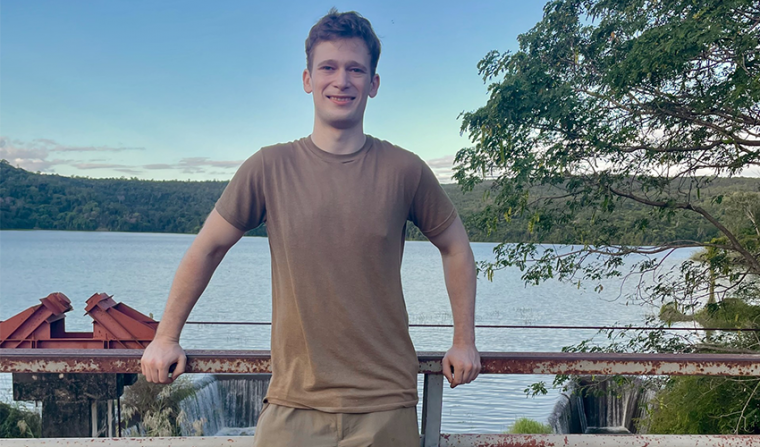
Hunter Rusk recently completed his BA Hons. (2024) in Geography with a minor in Applied Geomatics at the University of Guelph. He is now beginning his MSc in Geography, focused on passive microwave soil moisture monitoring from a UAV. Highlights include his adventures during his time with the Madagascar field school and his independent study leveraging high-tech remote sensing technology.
A Lesson from Madagascar: Overcoming Adversity Through Community
by Hunter Rusk, BA '24
My experiences during university, military service, and a field trip to Madagascar have taught me the critical role of community support in overcoming adversity. University can be stressful, especially if students have part-time jobs to pay for school, as I did by serving in the military reserves.
Overcoming this adversity requires a strong support network. I know this because a particularly disruptive concussion sidelined me for weeks, and it threatened to delay my graduation. However, because of the accommodations and support of my professors, workplace and family I rehabilitated and successfully passed my courses and presented my undergraduate research.
For me this support was possible with the Serving Scholars Program, which provides special academic accommodations to students enlisted in the military reserves so they can avoid scheduling conflicts.
Throughout my undergraduate degree, this support was invaluable and allowed me to balance my service with the Canadian Armed Forces in conjunction with my academic pursuits. The acknowledgment and accommodations provided by this program have enabled me to excel in both areas without compromising my commitment to either.

During my time at the University of Guelph, I also discovered the study abroad options. The most amazing opportunity was to travel to Madagascar, where I learned about One Health in a hands-on manner [1] while earning academic credits. This adventure immersed me in a foreign country and culture, where I gained lifelong friendships and skills. I made amazing friends from the Canadian and Malagasy students who participated in the field school.
During this trip had the privilege of meeting Dr. Travis Steffens and his colleagues at Planet Madagascar [2], a charity he started aiming to help build sustainable forest communities in Madagascar. Their dedication to restoring the natural environment through One Health principles has left a lasting impression on me.
In Madagascar, I witnessed the stark reality of environmental destruction. The majority forested areas have been converted because of logging, charcoal production, and slash-and-burn agriculture. I was supposed to learn about the implementation of conservation through studying the relationship between animals, humans and their shared environment.
However, it was also very difficult to find lemurs because of habitat destruction and poaching. This widespread anthropogenic destruction might suggest that the remaining natural areas need strict preservation. However, the approach taken in Ankarafantsika National Park challenges the traditional segregation of natural environments from human impact.

Unlike Canadian national parks, where humans were forcefully separated from the land, Ankarafantsika contains several villages within its borders. This strategy impressed me, as it aims to foster collaboration with Malagasy communities to create community-based environmentalism.
Dr. Steffens and his team seek to support these villages in being stewards of their land. They provide funding and training for patrol and fire management teams and employing a women’s cooperative to collect seeds, and build tree nurseries for local trees with practical uses for the community.
These initiatives not only help regrow forests and provide erosion control but also empower women by providing a revenue stream. The charity also built a school and provides conservation education, doctor visits, and women’s health initiatives so that there are lasting impacts.
This experience not only deepened my understanding of the local ecological challenges but also highlighted the importance of collaborative efforts in addressing them.
I was inspired to take a MSc in Geography and learn more about the interaction of human and physical environments. Through my journey, I have learned that overcoming adversity is possible with a strong community support network.